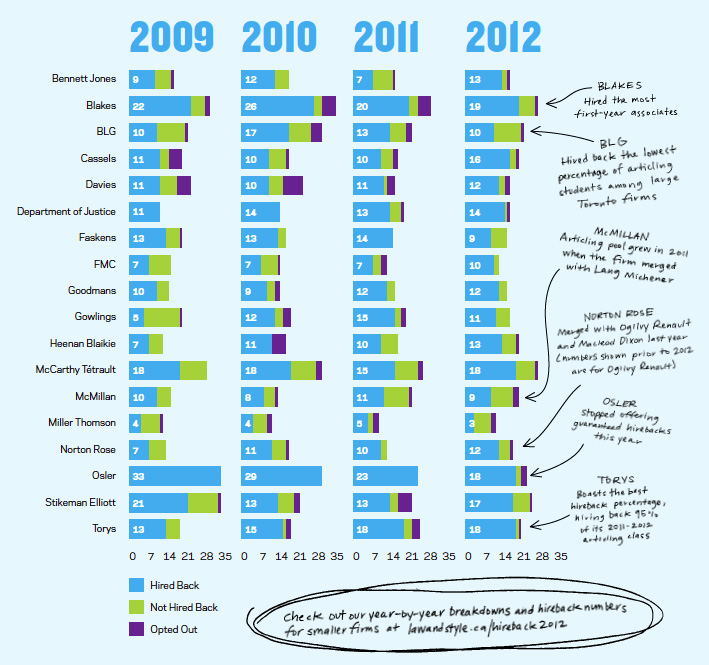
Good news for articling students who want a job at their firms: We built our graph (above) with data from the 18 law offices in Toronto that hired the greatest number of articling students in the past four years (that’s actually 17 firms, plus the Toronto office of the Department of Justice).

What does our graph say? Overall, 75 percent of articling students were hired back. That’s 234 hires from 312 students — there were originally 330 but 18 students opted out.
This contrasts in a big way to 2009 when the economic down- turn pounded the legal job market and just 67 percent of the articling students at these same firms landed associate positions. While that figure jumped to 77 percent in both 2010 and 2011, there were 30-plus opt-outs in both of those years.
Track a firm over a few years and you may notice a trend. Some hire far more articling students than there are available associate positions, while others see articling as a direct path to a job. “Our program really is an exercise in training our articling students to become associates at Torys,” says Deborah Dalfen, the firm’s director of legal recruitment and student development. “We invest a lot of time, money and energy in recruiting them, and our goal is to have them here for the long term.”
Most notably, Osler, Hoskin & Harcourt LLP has long guaranteed hireback for its students. But no more: it stopped making this promise to this year’s students. “as the years rolled on, we realized we didn’t actually need it,” says Mary abbott, chair of the students committee at Osler. “We realized that if we were disciplined and ensured that we hired the right people, that we would still continue to have a very strong hireback.” indeed, Osler hired 90 percent of its 2011–2012 articling pool.
But don’t get too obsessed with hireback stats. There’s so much more to a firm and how it treats students. Toronto-based lawyer coach Paulette Pommells suggests asking questions to discover which hires are actually “firebacks” — jobs that get nixed after a few months. She’s particularly wary of numbers from the Department of Justice, which may have only offered short-term contracts, rather than permanent positions, to its latest recruits.
In today’s increasingly tight market for articling positions, what matters most when choosing a firm (or having them choose you) is fit — you’ve got to mesh with the firm’s philosophy and workplace culture, or that job, short or long term, won’t help you build what you really want: an amazing career in law. Says Pommells, “getting to know who you are is key, no matter what the circumstance.”

This story is from the 2012 edition of PrecedentJD Magazine
